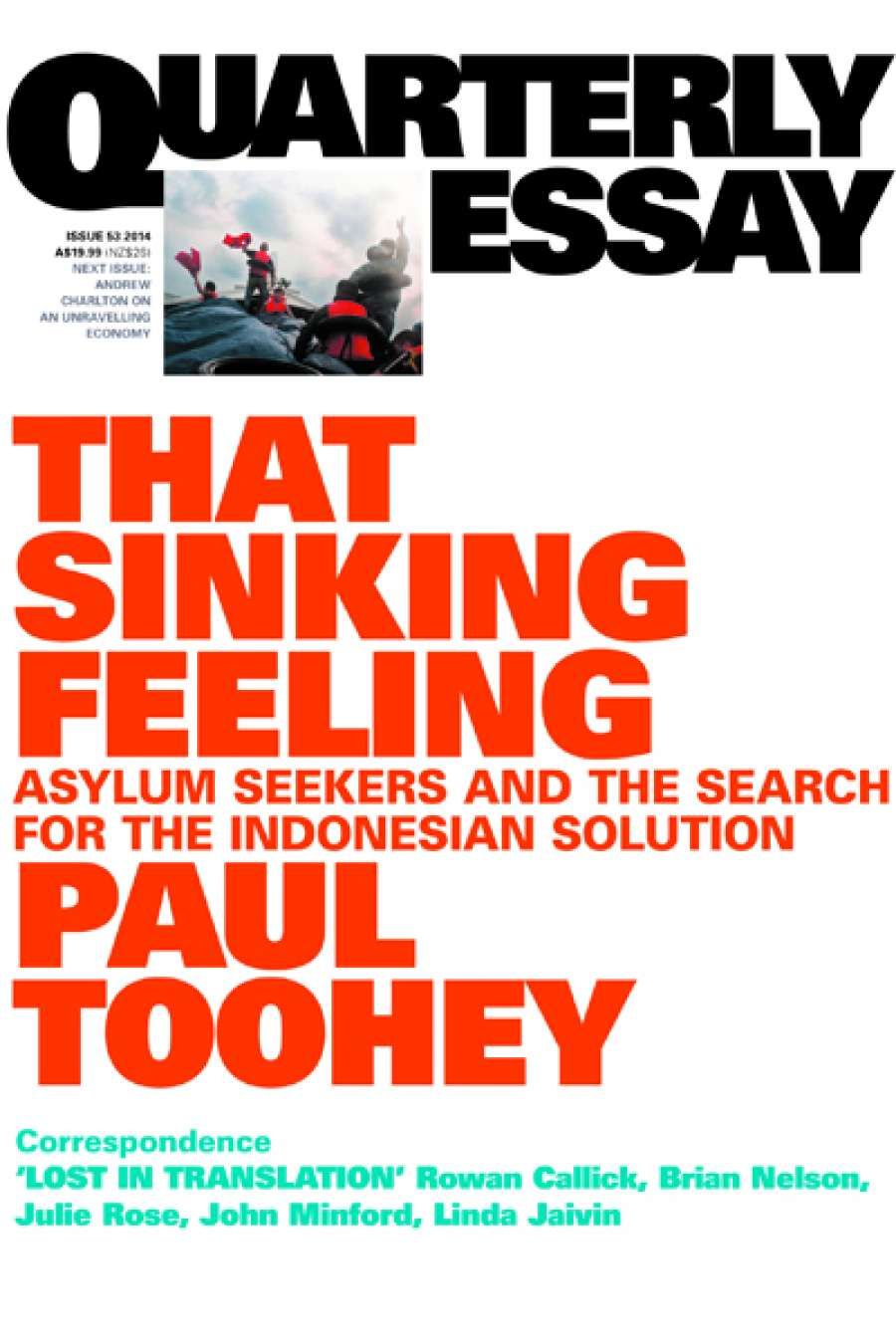
- Free Article: No
- Contents Category: Politics
- Review Article: Yes
- Article Title: Weary People
- Article Subtitle: Indonesia and asylum seekers
- Online Only: No
- Custom Highlight Text:
Do the ends always justify the means? And if the boats really have stopped coming, should we see the death of Reza Berati and the suffering of thousands as the collateral damage of a successful policy?
Paul Toohey’s panoramic sweep of this human, ethical, and political terrain begins with a visit to Cisarua, a small resort town in the mountains south of Jakarta that has become a major centre for people seeking asylum in Australia. Some are awaiting the outcome of formal applications for refugee status. Others are preparing to risk a boat. It is July 2013, two months before the federal election. Toohey spends time getting to know people, listening to tales of their journeys and, later in the essay, talking to survivors plucked from the ocean after a boat is lost at sea. If for no other reason, Toohey’s essay should be read for this; as a powerful, necessary reminder that ‘asylum seekers’ have stories, loves, fears, names, and faces.
- Book 1 Title: That Sinking Feeling
- Book 1 Subtitle: Asylum Seekers and the search for the Indonesian Solution (Quarterly Essay 53)
- Book 1 Biblio: Black Inc., $19.99 pb, 111 pp
It is also revealing to see how readily they can be located along with dozens of small-time people-smugglers and their agents. Google Earth will take you there and bring those details into sharper focus than most of us are accustomed to, given the government’s refusal to divulge ‘operational matters’ and longstanding restrictions on access to detainees. Journalists who do speak to asylum seekers are now routinely accused of being unpatriotic, of assisting people-smugglers and, by extension, of potentially causing the loss of lives. How this essay plays out in that scenario remains to be seen, but Toohey is particularly sceptical of a government that champions the right to free speech but imposes ‘growing controls on the ability to report and inform’.
Perhaps as a result of these restrictions, most Australians know next to nothing of the different nationalities and ethnicities of asylum seekers or the circumstances they are fleeing. Nor, in Toohey’s opinion, do they really care. Afghan Hazaras, Sri Lankan Tamils, Burmese Rohingya, Iranian Arabs and Kurds – most are escaping persecution. Others come in search of a better life for themselves and their children. All are ‘weary, weary people’ faced with problems that at times appear intractable. Toohey describes, for example, the plight of Persian Iranians who make up the greatest numbers of those typically described as ‘economic refugees’. Their applications for refugee status are regularly rejected, yet Iran refuses to take them back, meaning that up to 8,000 detainees have literally nowhere to go.
Toohey has seen enough to resist simple solutions and is intent on occupying a middle ground long abandoned. He gives the impression of a hard-boiled News Corp journalist let off the leash, reporting it as he sees it and sometimes allowing the facts to get in the way of a good story. He clearly regards tough offshore detention policies as an effective deterrent, though he is more aware than most of their brutality. He heaps scorn on Kevin Rudd for dismantling John Howard’s Pacific solution in the first place, and notes the drop in boat numbers that followed Rudd’s announcement of his pre-election deal with Papua New Guinea.
For Toohey, the ‘Fortress Australia’ mentality that policies like these perpetuate has other consequences. He suggests that the failure to find alternative solutions that are both effective and humane diminishes us as a nation and is evidence of our inability to engage with the outside world and to grow and change with it.
Comparing Australia’s response to unauthorised arrivals with that of the United States, he notes that,
In Australia, we saw things from an immediate policy perspective. We judged – and changed – governments on how they handled the big, live issues, taking a short-term view for fear of what the long-term picture might look like. We had not accepted that our nation was still a work in progress.
This is also reflected in the paternalistic attitudes on the asylum seeker issue exhibited by Australian leaders whose recent dealings with nations in the region have ranged from insensitive to bumbling. Abbott’s proposal to buy Indonesia’s flotilla of leaky boats, and the subsequent decision, under the terms of ‘Operation Sovereign Borders’, to turn asylum seeker boats back towards Indonesian waters, exhibited complete disregard for the impact this might have on the Indonesian relationship.
As the essay’s subtitle indicates, Toohey is especially troubled by this apparent inability or unwillingness to build the cooperation and diplomatic ties necessary for an Indonesian solution. Most Australians know very little about Indonesia, a state of ignorance that frequently manifests itself as suspicion and fear. Yet it is a vibrant multi-party democracy, one of the fastest growing economies in the world and, through its control of the region’s most strategically important sea-lanes, crucial to maintaining Australia’s national security as well as the flow of asylum seekers.
Some of the most promising recent commentary on asylum seekers and regional cooperation has come from Indonesian Foreign Minister Marty Natalegawa who stressed that the ‘cross border and complex nature of the irregular movement of persons defies national solutions [requiring a] coordinated approach … a sense of burden sharing and common responsibility’. Michael Bachelard in the Sydney Morning Herald (21 April 2014) reported Natalegawa’s comments as a ‘veiled criticism of Abbott’, but they also contain the possibility that the Indonesian solution Toohey despairs will never eventuate may still be within reach – but only if our leaders on both sides of the political divide are willing to risk what might happen if they stop talking tough.


Comments powered by CComment